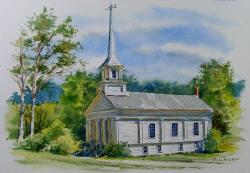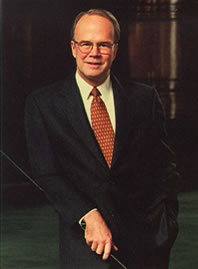 A series of 3 short articles by Dr. John MacArthur: (original source here).
A series of 3 short articles by Dr. John MacArthur: (original source here).
I love the church.
I am an inveterate and incurable lover of the church. It thrills me beyond expression to serve the church. Although I am also involved in some para-church ministries, I would not trade my ministry in the church for all of them combined. The church takes first place in my ministry priorities, and all the para-church ministries I serve are subordinate to, and grow out of, my ministry in the church.
In fact, my whole life has been lived in the church. My father was a pastor, as were my grandfathers for three more generations before him. So a deep love for the church practically runs in my blood.
In a short series of upcoming posts, I’m going to outline some biblical reasons I love the church. Let’s start with the first one today:
1. The Church Is Being Built by the Lord Himself
The church is the New Testament counterpart of the Old Testament Temple. I’m not referring to a church building, but the body of all true believers.
It is a spiritual building (1 Pet. 2:5), the dwelling-place of the Holy Spirit (1 Cor. 3:16-17; 2 Cor. 6:16), the place where God’s glory is most clearly manifest on earth, and the proper nucleus and focal point of spiritual life and worship for the community of the redeemed.
God Himself is the architect and builder of this temple. In Ephesians 2:19–22, Paul writes:
So then you are no longer strangers and aliens, but you are fellow citizens with the saints, and are of God’s household, having been built on the foundation of the apostles and prophets, Christ Jesus Himself being the corner stone, in whom the whole building, being fitted together, is growing into a holy temple in the Lord, in whom you also are being built together into a dwelling of God in the Spirit.
It is impossible to overstate the importance of the church in the eternal plan of God. The church is His building (1 Cor. 3:9). Moreover, He is the immutable, sovereign, omnipotent Lord of heaven. His Word cannot return void but always accomplishes what He says (Isa. 55:11). He is always faithful and cannot deny Himself (2 Tim. 2:13). His sovereign purposes always comes to pass, and His will is always ultimately fulfilled (Isa. 46:10). His plan is invincible and unshakable, and He will bring to pass all that He has spoken (v. 11). And he has spoken about building the church in the most triumphant words.
For example, in Matthew 16:18 Christ said, “I will build My church; and the gates of Hades will not overpower it.” He who knows His sheep by name (John 10:3)—He who wrote their names down before the foundation of the world (Rev. 13:8)—He personally guarantees that the gates of Hades will not prevail against the church He is building.
“The gates of Hades” was a Jewish expression for death. Hades is the place of the dead, and the gates of Hades represent the portal into that place—death itself. Hades is also the domain of the devil. Hebrews 2:14 refers to Satan as the one “who had the power of death,” and verse 15 says he used that power to keep people in fear and bondage all their lives. But now Christ has broken that power, and liberated His people from Satan’s dominion—in essence, he has broken down the gates of Hades. And therefore even the power of death—the strongest weapon Satan wields—cannot prevent the ultimate triumph of the church He is building.
There is still more significance to the imagery of “the gates of Hades.” Gates are a walled city’s most vital defensive safeguards. Christ’s words therefore portray the church militant, storming the very gates of hell, victoriously delivering people from the power of death. Thus Christ assures the triumph of the church’s evangelistic mission. He is building the church, and the work will not be thwarted.
Christ’s promise in this passage should not be misconstrued. He does not suggest that any particular church will be infallible. He does not teach that any of the bishops of the church will be error-free. He does not guarantee that this or that individual church will not apostatize. He does not promise success and prosperity to every congregation. But He does pledge that the church—that universal body of believers under Christ’s headship—will have a visible being and a testimony in this world as long as the world itself lasts. And that all the enemies of truth combined shall never secure the defeat or destruction of the church.
Notice also that the church is a work in progress. Christ is still building His church. We are still being joined together (Eph. 2:21). The church is still under construction (v. 22). God is not finished yet. The imperfections and blemishes in the visible church are still being refined by the Master Builder.
And here’s something remarkable: The plan for the finished product is a blueprint that was drawn in eternity past. Continue reading

